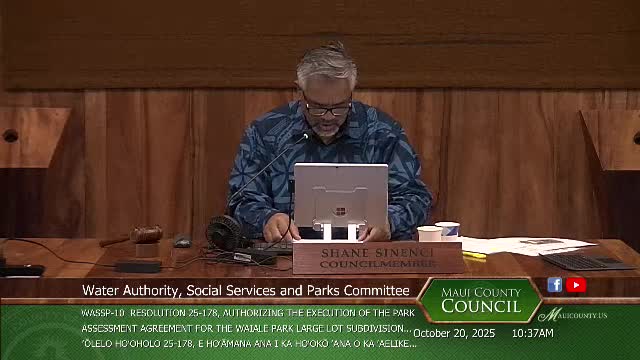Maui committee defers bill to increase penalties for vehicle sound systems after enforcement and legal questions
October 20, 2025 | Maui County, Hawaii
This article was created by AI summarizing key points discussed. AI makes mistakes, so for full details and context, please refer to the video of the full meeting. Please report any errors so we can fix them. Report an error »

The Maui County WASP Committee on Oct. 20 deferred Bill 119-2025, which would amend Maui County Code §9.36.040 to increase fines and permit possible forfeiture of sound-amplification systems for prohibited vehicle-noise violations. Committee members and county legal and law-enforcement representatives said additional work is needed to clarify enforcement procedures, evidence collection, valuation and interplay with state statutes before the committee acts on the measure.
Council Chair Alice Lee, who introduced the measure, told the committee the ordinance was originally adopted in 1990 after a fatal incident involving an extremely loud boombox and that modern technology and enforcement methods warrant updating penalties. “This is the reason why I am introducing this amendment to increase the penalties so that people will think twice about…blasting their radios and disturbing the whole neighborhood,” Lee said.
Deputy Prosecuting Attorney Shelly Dimatos told the committee that the office’s records show few recent prosecutions under the county noise ordinance: a five-year review indicated roughly seven or eight cases in prior years and none recorded for 2024; law-enforcement citations sometimes do not all appear in the office database because traffic-related matters move quickly. Dimatos said the office is available to work with the county on possible penalty language and implementation details.
Assistant Chief Greg Okamoto and Major Braden Ogata of the Honolulu Police Department described enforcement challenges and options. Okamoto urged practical, planned enforcement focused on complaint hotspots and said officers must document observations (estimated distance, audibility and vibrations) when issuing citations. Ogata said forfeiture generally proceeds through the court system and that police typically collect portable amplification devices as evidence; the police do not themselves conduct the forfeiture disposition.
Committee members and staff raised technical and legal questions the committee asked to have researched before further action: who determines the value of a seized amplifier, who removes and stores forfeited equipment, whether forfeited systems would be destroyed or auctioned, how to measure violations (distance, decibels or other criteria), and how the county ordinance might interact with state statutes governing mufflers and vehicle noise (Hawaii Revised Statutes §§291-24 and 291-24.5 were cited by Major Ogata as relevant to mufflers and vehicle equipment).
Members also discussed whether the county should coordinate with the Hawaii Department of Health on decibel standards and with Corporation Counsel to review potential conflicts with state law. The bill’s penalty scheme included a third-offense provision that combined a fine with forfeiture; members asked prosecutors to confirm how that would be implemented and what administrative or court resources would be required.
After discussion, committee members agreed to defer the bill to allow follow-up research by Corporation Counsel and consultation with the police and prosecuting attorney’s office. Deputy Dimatos said her office looks forward to working with county staff “to address this concern and issue.”
Council Chair Alice Lee, who introduced the measure, told the committee the ordinance was originally adopted in 1990 after a fatal incident involving an extremely loud boombox and that modern technology and enforcement methods warrant updating penalties. “This is the reason why I am introducing this amendment to increase the penalties so that people will think twice about…blasting their radios and disturbing the whole neighborhood,” Lee said.
Deputy Prosecuting Attorney Shelly Dimatos told the committee that the office’s records show few recent prosecutions under the county noise ordinance: a five-year review indicated roughly seven or eight cases in prior years and none recorded for 2024; law-enforcement citations sometimes do not all appear in the office database because traffic-related matters move quickly. Dimatos said the office is available to work with the county on possible penalty language and implementation details.
Assistant Chief Greg Okamoto and Major Braden Ogata of the Honolulu Police Department described enforcement challenges and options. Okamoto urged practical, planned enforcement focused on complaint hotspots and said officers must document observations (estimated distance, audibility and vibrations) when issuing citations. Ogata said forfeiture generally proceeds through the court system and that police typically collect portable amplification devices as evidence; the police do not themselves conduct the forfeiture disposition.
Committee members and staff raised technical and legal questions the committee asked to have researched before further action: who determines the value of a seized amplifier, who removes and stores forfeited equipment, whether forfeited systems would be destroyed or auctioned, how to measure violations (distance, decibels or other criteria), and how the county ordinance might interact with state statutes governing mufflers and vehicle noise (Hawaii Revised Statutes §§291-24 and 291-24.5 were cited by Major Ogata as relevant to mufflers and vehicle equipment).
Members also discussed whether the county should coordinate with the Hawaii Department of Health on decibel standards and with Corporation Counsel to review potential conflicts with state law. The bill’s penalty scheme included a third-offense provision that combined a fine with forfeiture; members asked prosecutors to confirm how that would be implemented and what administrative or court resources would be required.
After discussion, committee members agreed to defer the bill to allow follow-up research by Corporation Counsel and consultation with the police and prosecuting attorney’s office. Deputy Dimatos said her office looks forward to working with county staff “to address this concern and issue.”
View full meeting
This article is based on a recent meeting—watch the full video and explore the complete transcript for deeper insights into the discussion.
View full meeting
